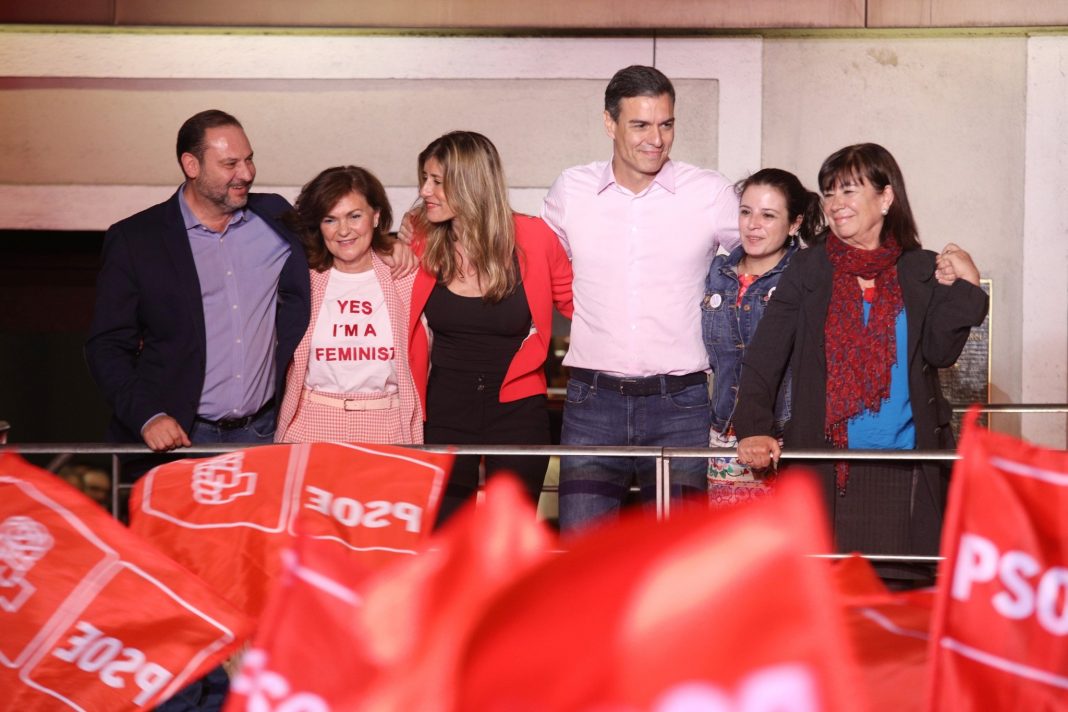Spain held general elections on Sunday 28, April. The election was marked by a high voter turnout (76%). According to preliminary results, with 99% of the votes counted, no party won an outright majority. Partido Socialista Obrero Español (PSOE, or the Socialist Party) obtained the most seats with 123 (85 in 2016) out of the 350 in the Congress of Deputies.
Trailing the Socialists by a significant margin, came Partido Popular (PP) with 66 seats (versus 137 in 2016), losing significant ground compared to the last election, closely followed by Ciudadanos (Cs), another right of centre party, with 57 seats (32 in 2016). Unidas Podemos, a left of centre party, obtained 42 seats (71 in 2016). The Vox party obtained 24 seats, becoming the first far-right party with representation in Congress since the return of democracy to Spain.
Therefore, PSOE and UP combined would sum up to 165 seats, falling short by 11 seats of an outright majority in Congress (176 seats). The sum of PP, Cs and Vox would sum up to 147 seats, well below the majority threshold.
Following the electoral results, DBRS views a Socialist-led government as the most likely scenario. DBRS expects the formation of a new government to take time. There are subnational and European elections looming in May. Also, the highly sensitive judicial process involving former Catalan government officials is ongoing. On the other hand, given the strong showing of PSOE, a hung-parliament and potential election re-run, or right-leaning government now seem unlikely.
DBRS considers two possible outcomes:
— A PSOE-led government with support from UP now seems the most likely outcome, in DBRS’s view. This political combination needs the parliamentary support from smaller parties. While winning an investiture vote in the first attempt needs an absolute majority, only a single majority is needed to win in the second attempt.
Therefore, an abstention of parties outside of the P-Cs-Vox parties could enable a PSOE-UP government to be formed, potentially without resorting to the Catalan pro-independence parties. Such a government does raise the risk of higher public spending potentially financed by higher taxation, or some rollbacks of structural reforms, which could exacerbate the ongoing economic deceleration in Spain.
Nevertheless, DBRS expects parties to respect and operate within the rules imposed by the EU fiscal framework. We expect the revenue measures included in the 2019 budget to serve as a blueprint for the future government, although the current stronger mandate could lead to more decisive measures.
— DBRS sees as less likely a PSOE-led government gaining an absolute majority with support from Ciudadanos. Under this scenario, DBRS would expect further fiscal consolidation with potentially a more business friendly fiscal policy and economic reforms to address Spain’s medium term challenges.
This option faces some internal resistance within both parties, with Cs explicitly ruling it out in the run-up to the elections, but an agreement could be reached further down the line, if a PSOE-UP agreement fails to materialise.
In Spain, support can take the form of a party joining a government as a minority partner or it can be in the form of explicit/implicit support in parliament.
DBRS’s overall view is that this election will not result in major changes in policy. Although some political uncertainty remains, DBRS considers that various features embedded in Spanish politics will constrain more radical outcomes. These include: strong support for centrist political parties, absence of meaningful Eurosceptic parties, and the commitment of mainstream parties to the EU fiscal framework.
Against this backdrop, DBRS does not foresee a significant impact on the economic or fiscal trajectory of the country as a result of the electoral outcome. DBRS expects growth will remain robust, despite the ongoing deceleration. For 2019 and 2020, DBRS expects Spanish growth to continue to outperform the euro area average.
Although increased political uncertainty could affect consumer and investor confidence, the Spanish economy has weathered successfully uncertain political times in the recent past. In DBRS view, during the political impasse in 2016 or the height of the Catalan crisis in late 2017, there was no palpable impact on economic growth.
In DBRS’s view, the fiscal and debt ratios will continue to decrease gradually helped still by the dynamism of Spain’s economy. Spain is set to exit its Excessive Deficit Procedure (EDP) after posting a general government fiscal deficit of 2.5% of GDP in 2018. DBRS is of the view that the next government will remain committed to fiscal consolidation, as evidenced in recent years.
However, more uncertain is the prospect for decisive measures to improve materially the structural fiscal deficit, improve the medium-term sustainability of the pension system, or improve potential growth.
In addition, the Catalan question and its political management will most likely remain at the centre of the political debate, as seen during the electoral campaign period.
There is a risk of a renewed escalation of tensions in coming months, as the Supreme Court may reach a verdict around the summer time, although the risk of a stand-off between the central and regional government has declined with the poor electoral result of PP-Cs-Vox combined in this election.
Nevertheless, the economic impact of the political situation in Catalonia has been relatively subdued so far.





